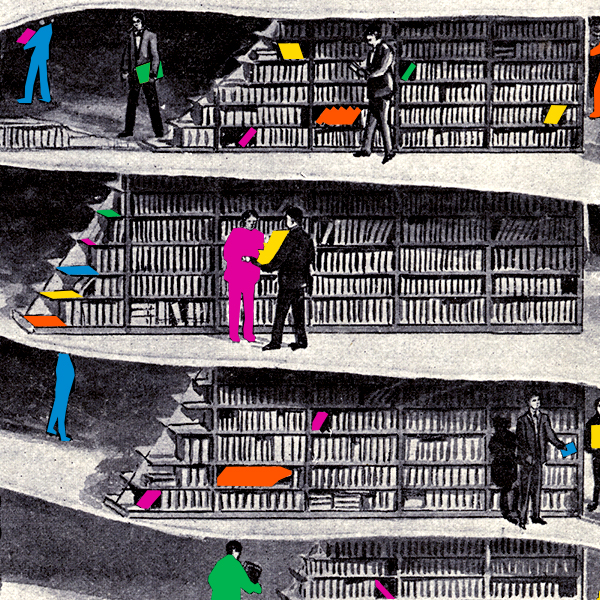You are a researcher and an active member of the Wiki community. How did this commitment come about?
My involvement in Wikipedia projects began during a research project. As part of my doctorate, I worked on the digitization of photographic archives, their circulation and how they were used after upload. I became interested in partnerships between the Wikimedia community and official institutions such as libraries and archives [1]1Archives
Diffuser, partager et s’approprier le patrimoine documentaire québécois. Le projet collaboratif de BAnQ sur Wikimédia: une première au Canada
2016.
In order to understand how Wikipedia worked, I began to contribute, bit by bit, to the encyclopedia by correcting articles and creating articles on themes that interested me, not necessarily related to my research themes, but things like buildings and places related to the neighborhood where I lived in Montreal.
At the same time, I continued my research on the issues of free licenses, the negotiation of reuse, the open use of historical documents and copyright protection.
So far, I have pursued these research fronts in parallel believing that while Wikipedia is a platform with flaws and imperfections, it does exist and everybody uses it. Researchers and those who are able to correct mistakes must therefore participate in its improvement.
Do researchers readily take on this responsibility?
I would say that researchers’ perceptions have changed in recent years; we have come a long way [2]2Journal of the Canadian Historical Association
History, Interactive Technology and Pedagogy: Past Successes and Future Directions
2012. We realize that Wikipedia is a tool for the democratization of knowledge, for scientific popularization. It is, so to speak, a communal encyclopedia. It is also a site that is used every day. It is somewhat hypocritical to criticize Wikipedia since as soon as we look for the slightest bit of information, this is where we go first. But I think this attitude is changing.
We are also seeing an increasing number of collaborations between Wikipedia and not only public institutions such as libraries [3]3Documentation et bibliothèques
Le Web 2.0 dans les bibliothèques: vers un nouveau modèle de service
2011, but also universities and student groups, who come together to carry out collaborative activities. Professors and teachers are increasingly including Wikipedia in their classes for writing exercises [4]4Revue internationale des technologies en pédagogie universitaire
Pratiques d’écriture en ligne pour l’apprentissage des langues
2011, literature reviews, and quotation and source validation.
Most researchers are also educators or teachers. They are alert to questions concerning the transmission and democratization of knowledge and see the potential of Wikipedia in this regard. For some, of course, it is easy to get started; for others it requires support.

Wikipedia is therefore an educational tool?
Collaborating with Wikipedia helps to develop a number of skills [5]5Documentation et bibliothèques
Wikipédia, la chimère du savoir libre
2016.
One of the linkages between Wikimedia’s principles and scientific culture is the importance of citing sources. You cannot create an article on Wikipedia if there is not at least one, if not two or three, references. This is a sine qua non condition. Now, as teachers, we are always telling our students to quote their sources.
It can also be a way to motivate students. Clearly, working on a term paper knowing that it will end up at the bottom of a drawer is less motivating than knowing that one is contributing to an article that may be consulted by thousands of people.
Another interest is the discovery of the code behind Wikipedia, the “wikicode”, which is a simplified form of html. For those who do not know much about html or who want to learn, it is a great opportunity to become familiar with a markup language.
There is also the issue of metadata, which is another important aspect. When you upload an image or a file in Wikimedia Commons, the multimedia database, it is essential to refer to it, to describe it and to add categories so that it can be found. Indexing is a really important skill in digital literacy [6]6Éducation et francophonie
Le Web 2.0, rupture ou continuité dans les usages pédagogiques du Web?
vol. 41, no 1.
Finally, it raises awareness of the issue of copyright compliance in the context of free licenses, since Wikipedia uses Creative Commons licenses. There is this idea that, with free licenses, we can do anything, we can take and reuse things without citing anyone [7]7Documentation et bibliothèques
Les enjeux des bibliothèques musicales à l’ère des pratiques culturelles numériques
2007. This is an opportunity to raise awareness, to explain that a free license does not mean free to do anything. Copyright is another important feature of digital literacy.
Can you give us concrete examples of workshops, training programs or projects?
Every month, my colleagues at Wikimedia Canada give workshops at the Bibliothèque et Archives nationales du Québec (BAnQ), in collaboration with the Association francophone pour le savoir (ACFAS) and the Fondation Lionel-Groulx. These are workshops open to the public; everyone can participate.
I do more specific training in the context of projects that may be research projects. For more advanced, more technical training, I work with Wikimedia Canada. They have developed an expertise in terms of training and I can talk about links with the world of research or support a process of reflection.
For example, a colleague (Karine Gentelet) and I, along with Wikimedia Canada, are involved in the project “Knowledge, culture and Atikamekw language in Wikimedia projects“, which was initiated by members of the Atikamekw community and teachers from Otapi High School (Manawan). We are putting together a toolbox for the project in case other First Nations want to do the same thing, that is, create an encyclopedia in their language.

